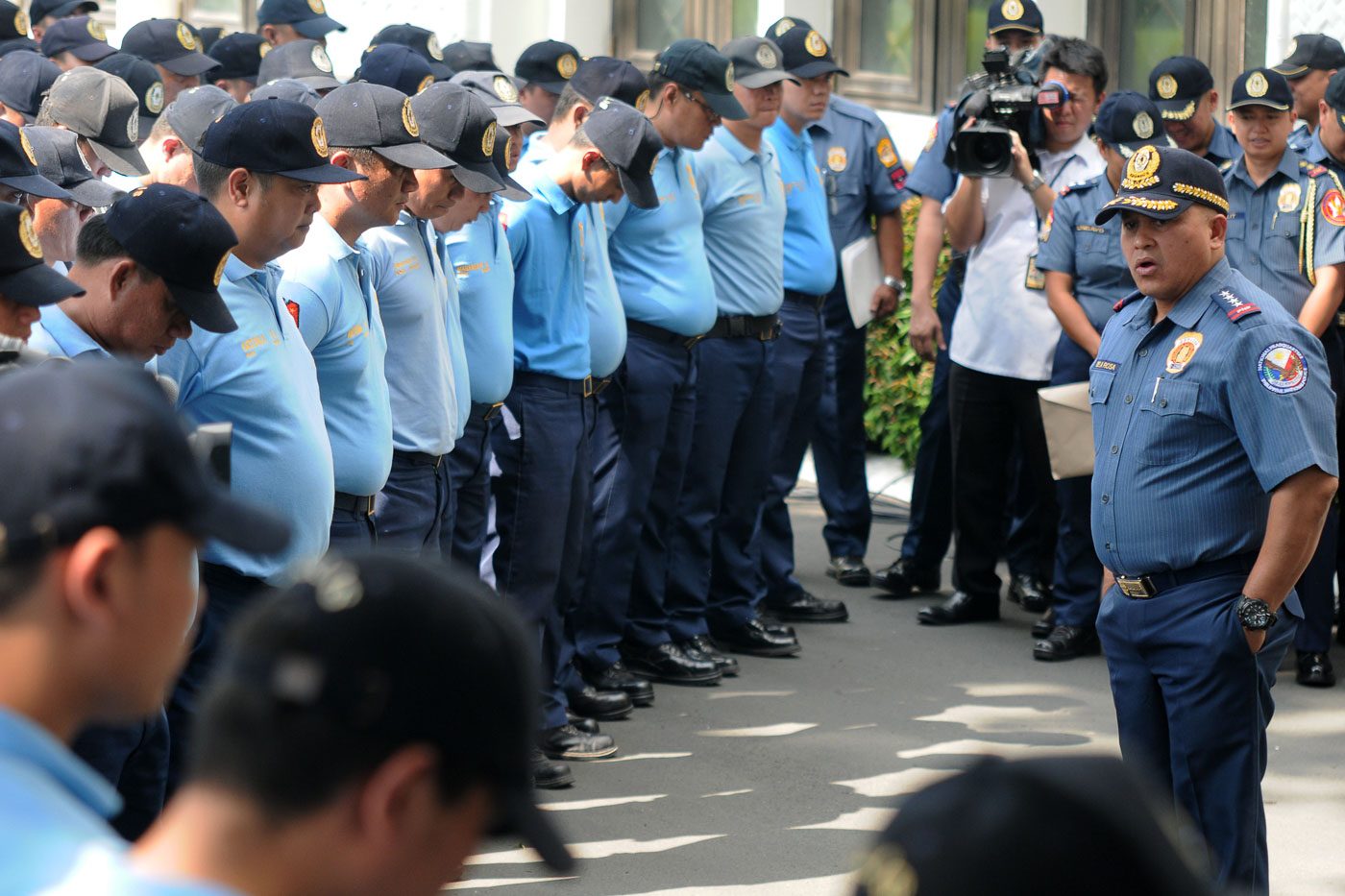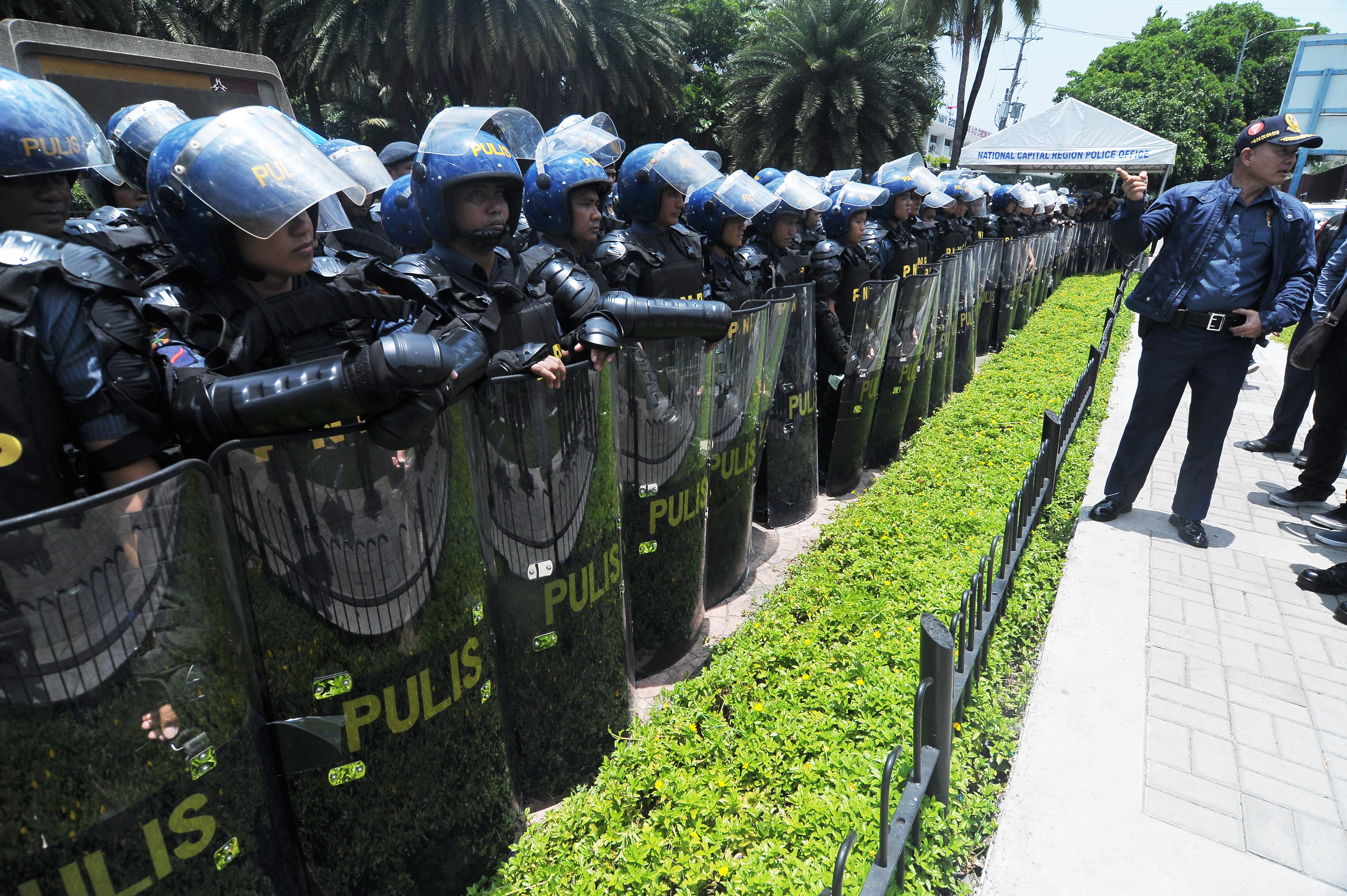SUMMARY
This is AI generated summarization, which may have errors. For context, always refer to the full article.

MANILA, Philippines – It was one of the more sentimental press conferences of Ronald dela Rosa as the chief of the Philippine National Police (PNP). Reporters were asking President Rodrigo Duterte’s favorite cop why the police got suspended again from its lead role in the “war on drugs.”
Where did the PNP go wrong in the landmark campaign?
Dela Rosa replied late last year: “Dapat sana na-cleanse muna namin ‘yung aming ranks bago kami bumanat sa war on drugs para hindi masakyan ng mga hunyango na mga narco cops.” (We should have cleansed our ranks before we waged the war on drugs so that scalawag narco cops would not be part of it.)
This perspective is nothing new, especially since Duterte campaigned on a promise to end crime. He would not be able to accomplish this without a clean and efficient police.
As a candidate, he even gave crooked cops an ultimatum:”I’ll have you killed.”
A new police chief, Oscar Albayalde, has since replaced De la Rosa.
Scalawags continue to plague the ranks of the PNP. And Duterte’s promise to end drugs and crime remains to be a fantasy.
Top police officials at Camp Crame know this, with their spokesperson Senior Superintendent Benigno Durana describing scalawags as “termites within the household”, the “excess baggage” of a supposedly clean police force.
‘Hijacking’ the drug war
As the body count soared during the early weeks of the administration’s relentless anti-illegal drugs campaign, cops earned a reputation as extrajudicial killers.
The PNP first denied the presence of scalawags in the campaign, but media reports and eyewitness accounts persisted. (READ: The Impunity Series)
Police officials then blamed bad eggs in the ranks for “hijacking” and “sabotaging” the drug war. It would be the same tune played by the PNP when a string of teen killings in Caloocan City triggered public outrage, and it would be the same defense when cops made mistakes outside drug operations.
In December 2017, Mandaluyong policemen failed to coordinate with barangay (village) officials when they responded to a distress call, mistakenly shooting a car that was supposed to bring injured victims to the hospital.

At least 2 innocent people died in the incident, and over 11 cops were sacked, including the Mandaluyong police chief.
Recently, a foreman’s live-in partner and their 7-year-old child were kidnapped by Muntinlupa cops in the guise of an anti-illegal drugs operation. They asked the foreman for P40,000, prompting him to report the incident to authorities. This caused a revamp in the city’s anti-drug unit.
Culture of bad apples?
The PNP’s strategy is to isolate the bad cops from the rest and punish them publicly.
This tactic does not work, according to security consultant and long-time observer of the PNP, Michael Brown.
“It’s the police culture. That’s much, much bigger than a few bad apples. If you are not willing to recognize the extent of the corruption problem, then youll never solve the problem,” Brown told Rappler in a video call interview.
As numbers kept by the PNP itself show, it’s more than just a few bad apples.
Data show the PNP has punished 6,401 personnel ever since Duterte assumed office in 2016. Some complaints, Durana said, were a product of the PNP’s own investigation, while other cases sprang from criminal cases filed by civilians.
Rappler breaks the number down below.
Dela Rosa earlier claimed that only 2 in every 100 cops are scalawags.
Using the estimate of the PNP that they now keep 190,000 personnel, the recent numbers show that 3 in every 100 have been punished for breaking procedure.
Cops who have been punished have appealed to the National Police Commission, where they can ask an appelate board to overturn or reduce the penalties.
The numbers can still rise as the PNP is currently hearing 3,101 administrative complaints involving 6,009 personnel.
These numbers, according to Brown, are rooted in bad culture developed over time and best illustrated in the sense of impunity within the police.
“They (cops) learn all the proper procedures then as soon as they go out to the field, their supervisors and their police chiefs and the guys they’re partnered with will say ‘Okay, that’s all great, you learned all that, but now let me show you how it’s really done.’,” he said.
“That’s where all the shortcuts and the basically improper behavior comes in, and this is true with cops around the world,” said Brown, a retired officer of the United States Air Force.
Procedural and rhetorical cleansing

The PNP has 2 independent bodies that are assigned to cleanse the police of scalawags: the Internal Affairs Service (IAS) and the Counterintelligence Task Force (CITF).
The IAS is tasked with investigating cops and recommending criminal charges, while the CITF is an operating unit known for its entrapment operations.
By its own count from its creation in February 2017 up until July 16, 2018, the CITF said it contributed to the build-up and filing of 707 cases, including administrative cases that used their probe findings.
Beyond these 2 units, the PNP has also released memorandum circulars that pass on the burden of disciplining cops to the local police commanders.
In the revised anti-drug campaign guidelines, commanders were warned about losing their positions if their subordinates are found to be involved with illegal drugs.
Durana also said the PNP is optimistic that the words of leaders – from Duterte himself to top PNP officials – will get through to the cops.
But are these enough?
According to Brown, the statements would only be empty rhetoric unless culture is tangibly changed.
It does not help that sacked cops linked to controversies have been returned or “recycled” by the PNP, sometimes to higher positions.
Even more, it does not help that the President has said that he would protect cops, even if they killed people, as long as they claim that they did it in their line of duty.
“It’s all rhetorical because the cops themselves, the senior leadership, and the people in the field don’t believe that they really have the problems that these programs are intended to fight,” he said.
Policing the police

“It’s a work in progress,” PNP spokesman Durana said when asked to describe their internal cleansing program.
“Gaps, infirmities in our systems and procedures in terms of human resource, operations, et cetera that provide opportunities for people to do such things we consider irregular and illegal, corrupt practices, negative bureaucratic behavior,” he admitted.
Durana’s evaluation is seconded by Brown. “To a certain extent, they are shielded from the eyes of the law, you know, because they are the eyes of the law,” Brown said.
According to Durana, the PNP is too focused now on punishing cops that they have overlooked two fundamental steps in keeping a police force clean: prevention and restoration.
Preventing the proliferation of scalawags, Durana said, involves employing a high-standard selection process and an intense training program. The neglect to focus on this has led to the newbies in the force being also quickly dismissed, he said.

In this thrust, police chief Albayalde has been pushing to require rookie cops to undergo a 6-month training program under the elite police Special Action Force. This has yet to translate to policy.
Restoration, on the other hand, involves “re-educating” punished cops about the PNP’s ethical and operational guidelines so that if ever they didn’t get dismissed for an offense, they are at least reminded of not repeating mistakes.
“When you say zero tolerance, that doesn’t mean that they will not undergo due process. In the course of giving them due process, we will also find out that some people can be restored,” Durana said.
The PNP does not know how long it would take to at least minimize the presence of scalawags, but one thing is certain: they cannot complete the President’s promise to end – or at least minimize crime – if they themselves have criminals among their peers.
“If you have a clean police force, you have an effective police force, and the result is you have less crime. If you have a crooked police force, not only are they not enforcing the laws among the citizenry, they’re doing crimes themselves. That’s much worse,” Brown said. – Rappler.com
TOP PHOTO: INTERNAL CLEANSING. The PNP wants to expand its ‘punitive’ cleansing program to ‘preventive’ and ‘restorative’ measures of weeding out crooked cops. Graphic by Ernest Fiestan/Rappler
Add a comment
How does this make you feel?
There are no comments yet. Add your comment to start the conversation.